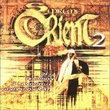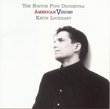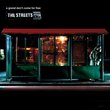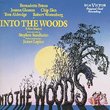| All Artists: Saint-Saens, Poulenc, Durufle, Pretre Title: Organ Symphony / Les Animaux Modeles Members Wishing: 0 Total Copies: 0 Label: EMI Classics Original Release Date: 1/1/2002 Re-Release Date: 8/13/2002 Genre: Classical Styles: Chamber Music, Historical Periods, Modern, 20th, & 21st Century, Symphonies Number of Discs: 1 SwapaCD Credits: 1 UPC: 724357475327 |
Search - Saint-Saens, Poulenc, Durufle :: Organ Symphony / Les Animaux Modeles
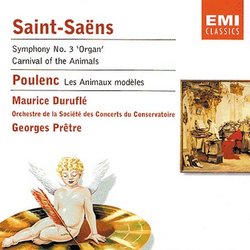 | Saint-Saens, Poulenc, Durufle Organ Symphony / Les Animaux Modeles Genre: Classical
|
Larger Image |
CD DetailsSimilar CDsSimilarly Requested CDs
|
CD ReviewsFrench music by French masters Benjamin R. Cox, III | Groveland, Fl United States | 02/21/2005 (2 out of 5 stars) "Having played with the London Symphony when I was a student, I became acquainted with many musical styles. I also became convinced that while Delius should only be played by English orchestras, French music should remain with the French! George Pretre is a master! He was Maria Callas' conductor of choice during the final years of her career. He does a marvelous job with the music of Saint-Saens and Poulence in this recording. The "Organ" symphony has true French colourings, especially in the horns and trombones and it is true joy to hear the symphony played in a church with a real pipe organ, not dubbed in later. Yes, the organ at St. Etienne-du-Mont was out of tune and the beautiful acoustics sometimes hide some of the detail, but the sound is lovely, and well recorded. Another difference that I noticed is that Pretre actually achieves emotional believability in the slow movements. They have space and become lyrical, and touch the heart. One realizes that this is not "light" music. The recording has depth and breadth, made possible again, by recording in the church in Paris. This is a recording not to be missed. The Carnaval des Animaux is played "tongue in cheek" with much humour and much love. I particularly enjoyed the "Pianists-fossils"! (Piano and organ are my instruments.) The Poulenc is played with wit and sarcasm and is almost "laugh out loud" funny. This is a great recording of great French music, performed correctly by French musicians. I first owned it on vinyl and was very glad to see that it had made it to CD. " A bargain "Organ Symphony" in exciting sound Santa Fe Listener | Santa Fe, NM USA | 07/04/2006 (4 out of 5 stars) "The first bars of this recording grab your attention--the massive church organ and huge acoustic are captured very well by EMI's engineers. Saint-Saens' Organ Symphony has always been played as a sonic blockbuster, and Pretre's version has more visceral impact than the classic one by Munch and the BSO on RCA because the scale is twice as large. Musically, Pretre is leading a French orchestra, and their peculiar tonality seems perfect in this music--pointed, precise, and unsentimental. There's plenty of bombastic triumphalism for the finale, too. Highly recommended as a budget buy. The generous fillers include The Carnival of the Animals, without narration, that Pretre leads rather aggressively, and Poulenc's nearly forgotten ballet, The Model Animals, which doesn't try to be humorous or to evoke each animal with orchestral effects. It's in Poulenc's cheeky mixture of updated Offenbach and Charlie Chaplin movie music, with some undertones of worldly melancholy. If you didn't know the title, you'd never suspect the work of being zoological." French Delight, But Beware an Echoey "Organ Symphony" Moldyoldie | Motown, USA | 11/11/2008 (4 out of 5 stars) "The old '60s Angel LP release of this recording of the popular Saint-Saëns Organ Symphony was my first experience with it, and frankly, it sounded awful -- muddy, distorted, an utter grate on "virgin" ears -- only ameliorated years later by finally "splurging" on the LP of the now-legendary Munch/BSO (Saint-Saëns: Symphony No.3/Debussy: La Mer/Ibert: Escales). My getting this bargain-priced CD was based on price, compelling reviews, and a predilection to give everything at least a second chance, especially after so many years. That the recorded sound on this CD is quite good for its ultra-spacious approach sort of substantiates what I've often read about certain domestic LP pressings of imported sub-masters and the resultant generational degradation. In any case, this was recorded in the ultra-reverberant acoustic of Salle Wagram in Paris, apparently concurrent with the organ and not with it dubbed in later as is often the practice. While the performance itself is grand, sonorously blended, and expansive; one gets the impression that the venue is as much on display as the music. Many orchestral details otherwise evident in modern recordings are consequently lost in the thick voluptuous velouté. However, I often enjoy hearing this symphony performed in a "natural" acoustic and as something other than an in-your-face woofer-busting "sonic spectacular". Comparatively speaking, conductor Prêtre's tempos often border on lumbering, but the reverberance practically dictates it. The symphony is nonetheless brought home memorably with the final chords allowed to hang and dissipate wholly into the ether.
I'd suggest to modern fans of the Organ Symphony to give this a try, especially at the price. While it's certainly more deliberately expansive and "grand" than the seemingly smaller-scaled and more incisive Martinon recording of about ten years later, it also contrasts with the classic Munch/BSO and Paray/DSO recordings (Saint-Saëns: Symphony No. 3; Paray: Mass for the 500th Anniversary of the Death of Joan of Arc) which precede it by a few years, making for an inexpensive alternative. To me, Carnival of the Animals is a delightful diversion; I suppose this performance is as good as any for the price as many of the tunes are catchy and ring familiar. However, this is my introduction to Poulenc's Les Animaux modèles (Model Animals), an orchestral suite from a ballet composed in 1942. Whatever it has to do with the animal kingdom mostly escapes me, but it certainly displays an episodic program and some beautiful orchestral writing, mostly prototypical of 20th century French Romanticism, while evoking a modicum of drama interspersed with a mostly uplifting and dancing lilt throughout. I just might return to this soon for further scrutiny. " |

 Track Listings (19) - Disc #1
Track Listings (19) - Disc #1